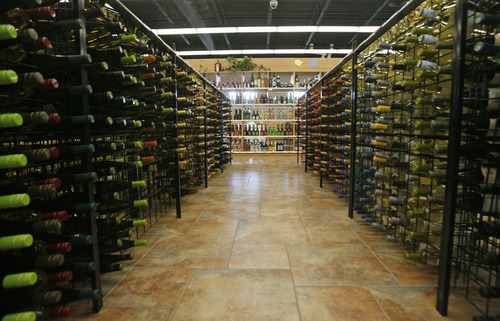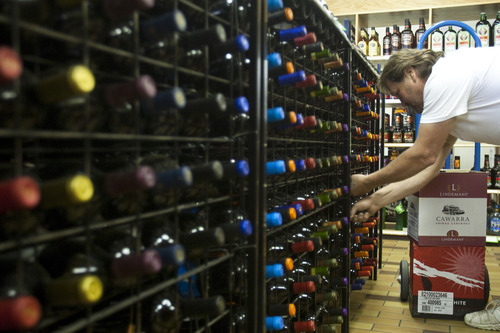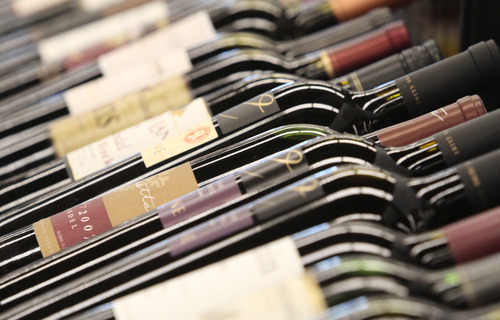This is an archived article that was published on sltrib.com in 2012, and information in the article may be outdated. It is provided only for personal research purposes and may not be reprinted.
The majority of workers in the state's liquor agency, already the lowest paid among their contemporaries in other liquor-control states, missed out on a raise July 1 at a time when alcohol markup fees in Utah also increased.
The Utah Department of Alcoholic Beverage Control raised warehouse handling fees beginning that day from 42 cents to 91 cents for each case of heavy beer, wine and distilled spirits. State officials say they do not know how much cash will be generated from the new markup, but based on 2011 sales, the department could generate at least $1.3 million in revenue for the state from the increase.
Coincidentally on July 1, a 1 percent pay increase went into effect for state workers who are classified as "benefited." But most part-time workers did not receive the raise because the majority of them do not fall into that category.
This hit employees in the DABC especially hard, because it relies heavily on part-time workers to run its warehouse and state liquor stores. Nearly 60 percent of the department's 616-member workforce missed out on the pay raise.
Frustrated workers and at least one lawmaker say things should be more fair in a department that has a high turnover rate and high associated costs.
"This is a slap in the face of all the part-time employees who show up and do their jobs just like the full-timers for less pay," said one liquor worker who asked that his name not be used for fear of retaliation. "By the way, the 1 percent pay increase for a part-time DABC employee would be less than 9 cents per hour."
State Sen. Gene Davis, D-Salt Lake City, said Utah needs to do a better job paying its liquor workers.
"It isn't fair to the workforce of the state of Utah for employees to work two or three jobs just to make ends meet," he said. "We need to look at paying a decent wage for a decent days work."
Utah has long maximized liquor profits by relying on part-timers, who also are ineligible for medical insurance, vacation pay or sick leave. No other state department has a higher percentage of part-time workers than the DABC.
An analysis by The Salt Lake Tribune in 2010 showed that Utah liquor workers' pay is not only among the lowest in the state but also is dead last when compared with all other states that operate retail liquor outlets. In Utah, the pay scale for an entry-level clerk was $8.60 per hour, while the range went from $9.60 in Idaho to $14.90 in Pennsylvania. Most other liquor-control states also extended some type of benefit to part-time workers.
From the state of Utah's point of view, "all other agencies were treated the same as DABC regarding distribution of the 1 percent salary increase," Jean Mills, deputy director for the Department of Human Resource Management said in an email. "This approach is consistent with how the state has distributed past salary increases."
That being said, Bob Springmeyer, a principal with the Salt Lake consulting firm Bonneville Research, believes that poor working conditions and inadequate pay account for the high turnover of liquor workers, which for the past five years has averaged 61.5 percent.
Last year alone, worker turnover at the DABC cost the state $226,380 in training, orientation and recruitment expenses, according to a Bonneville Research report, for which state lawmakers paid the firm $100,000 to conduct last year to find department efficiencies. Comparable figures for other state departments were not available.
"The turnover is costing the state a substantial amount — a lot more than it would cost if the workers were paid reasonable wages," Springmeyer said. "It's consistent with trying to save pennies while throwing away $100 bills."
One state liquor worker, who also asked that his name not be used, said the confluence of the state generating more revenue from alcohol markups at the same time most liquor workers were going without a raise has devastated morale.
DABC spokeswoman Vickie Ashby said handling costs have not been increased since 1999 and that the new fee matches costs charged by Alabama, which along with Utah has the nation's lowest handling fees.
The Tribune analysis showed that Alabama liquor workers were paid $1.11 per hour more than their Utah counterparts, and were eligible for benefits.
Utah spends only 11 percent of the DABC budget on wages and other operating costs to run its state-controlled liquor distribution system, while collecting more than three times that amount in sales taxes, school lunch subsidies and profits that flow directly into the state's general fund.
Twitter@DawnHouseTrib —
Utah liquor workers
Employee churn • The worker turnover rate for the past five years averaged 61.5 percent in the Department of Alcoholic Beverage Control.
Turnover costs • Last year, the state spent $226,380 in training, orientation and recruitment to replace workers who left. Turnover was 71.5 percent in 2007, with associated costs totaling more than $400,000.
Source: Bonneville Research







